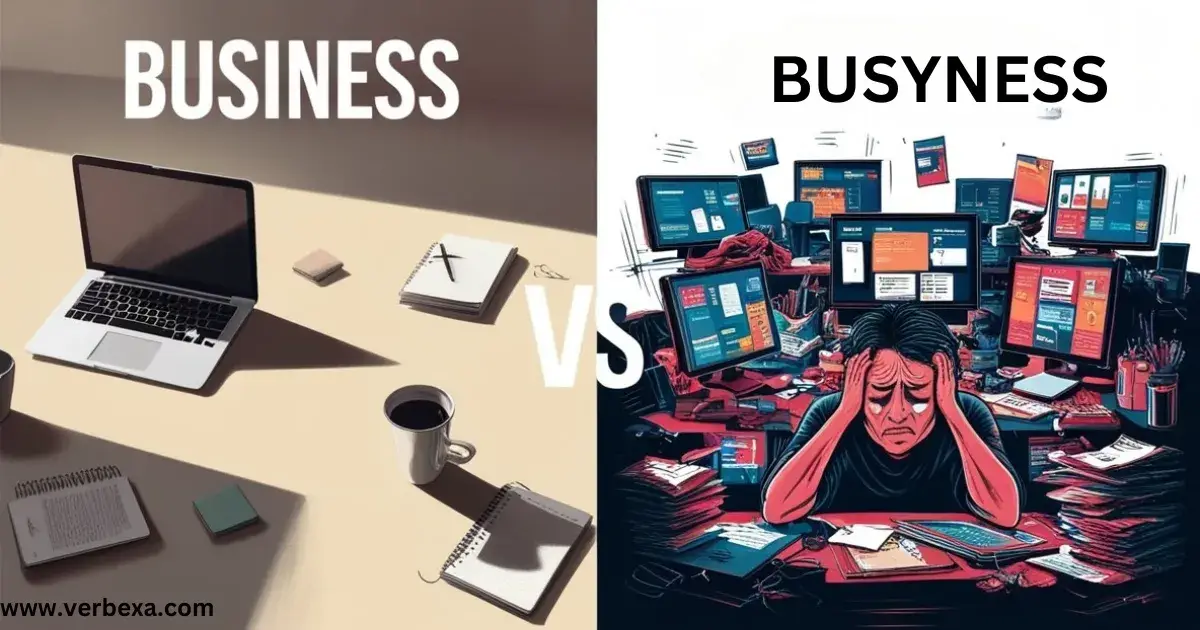Understanding the business vs busyness distinction is crucial in today’s fast-paced world, where time management is essential for success. People often confuse these two terms, but they represent vastly different concepts.
Business refers to goal-oriented activities, often centered around commerce or professional work, while busyness involves being constantly occupied with tasks that may not always yield meaningful results. This article dives deep into the differences between business vs busyness, offering clear definitions, usage tips, and practical examples.
What is Business?

Business is a term used to describe an organized effort to produce and sell goods or services with the aim of making a profit. It’s often associated with commerce, industry, or entrepreneurial ventures. Business activities involve strategy, planning, and long-term vision.
Examples of Business:
- A business can refer to a store that sells shoes.
- An entrepreneur launching a startup in the tech sector is engaging in business.
- Running a business can involve hiring employees, managing finances, and driving profits.
Business focuses on tangible goals such as financial growth, customer acquisition, and market expansion. It’s organized and strategic, often requiring investments in time, money, and resources.
What is Busyness?

On the other hand, busyness refers to the state of being occupied with activities, often without a clear or productive outcome. People who are caught in busyness may feel overwhelmed by tasks but accomplish little of real value. Busyness is commonly associated with running around without purpose, focusing on minor tasks rather than significant, goal-oriented work.
Examples of Busyness:
- Checking emails constantly without addressing important issues can create a sense of busyness without productive outcomes.
- Running errands all day that don’t contribute to any substantial progress is an example of busyness.
- Spending time in meetings that don’t move projects forward is another form of busyness.
Busyness often arises from a lack of prioritization and poor time management, leading to a feeling of being overwhelmed, but without meaningful results.
Key Differences: Business vs Busyness
| Aspect | Business | Busyness |
|---|---|---|
| Definition | An activity focused on commerce or trade aimed at profit | A state of being overly occupied with tasks, not necessarily productive |
| Focus | Long-term goals, strategy, profit | Short-term tasks, often without purpose or productivity |
| Productivity | Results in measurable outcomes like revenue or growth | Often results in no significant progress |
| Energy | Directed and purposeful | Dispersed and scattered |
| Time Management | Planned and structured | Chaotic and reactive |
When to Use Each Term
Choosing between business and busyness depends on your context. If you’re discussing a company, industry, or any profit-driven enterprise, you should use business. On the other hand, if you’re talking about someone who is caught up in endless tasks without clear outcomes, busyness is more appropriate.
Examples of Correct Usage
- Business: “She owns a successful business that specializes in graphic design.”
- Busyness: “His busyness with emails all day kept him from focusing on his major project.”
Synonyms for Business
Here are 10 synonyms for business, each offering a different perspective on the term:
- Commerce
- Enterprise
- Trade
- Firm
- Industry
- Corporation
- Company
- Organization
- Profession
- Occupation
These synonyms often describe the structure or function of a business in different ways. For instance, “enterprise” often refers to a large-scale or innovative business, while “firm” might refer to a professional services business like a law or accounting firm.
Synonyms for Busyness
Here are 10 synonyms for busyness that capture the sense of being occupied without necessarily being productive:
- Liveliness
- Activity
- Hustle
- Attentiveness
- Vivacity
- Occupation
- Engagement
- Frenzy
- Hecticness
- Overwork
While these words convey the idea of being occupied, they don’t always imply that the tasks being performed are meaningful or productive. Busyness can sometimes lead to stress or burnout without leading to any real progress.
Pronunciation of Business vs Busyness

Business: /ˈbɪz.nɪs/
- This term is pronounced with a short “i” sound, like in “bit,” and ends with a soft “s” sound.
Busyness: /ˈbɪz.i.nəs/
- This term has the same first syllable as business, but it adds an “i” sound in the middle and ends with a softer “ness.”
Despite the similarity in spelling, business and busyness differ slightly in their phonetic structure. Knowing how to pronounce these words correctly helps avoid confusion when speaking.
Is Busyness a Real Word?
Yes, busyness is a real word. It is derived from the adjective “busy” with the addition of the suffix “-ness,” which transforms it into a noun, meaning the state of being busy or occupied.
Historically, busyness has been used since the 14th century and was initially associated with being engaged in activities, often with a connotation of trivial or unproductive tasks. Over time, it has come to describe a state of constant activity, even if those activities don’t lead to meaningful outcomes.
Busyness vs Similar Words
While busyness refers to the condition of being busy, it differs from words like activity, engagement, or productivity:
- Activity refers to any action, usually without implying productivity.
- Engagement involves participation or commitment to a task or purpose.
- Productivity suggests efficiency and the achievement of significant results.
Grammatical Points: Business vs Busyness

Both business and busyness are nouns, but their meanings and grammatical usage differ significantly.
- Business: Often used as a subject or object in a sentence. It can refer to an industry, company, or commercial activity.
- Example: “His business grew exponentially last year.”
- Busyness: Refers to the state of being busy or occupied, often used to describe someone’s mental or physical state.
- Example: “Her busyness with social events prevented her from focusing on work.”
The suffix “-ness” turns the adjective “busy” into a noun, forming busyness. This is the key grammatical difference.
Etymology of Business vs Busyness
Business:
The word business comes from the Old English bisignes, which originally meant “care” or “anxiety.” It later evolved to describe an occupation or trade. Over time, the term expanded to mean any form of commercial activity or work.
Busyness:
Busyness evolved from the word “busy,” which comes from the Old English bysig, meaning “engaged in activity.” The “-ness” suffix was added to create the noun form, emphasizing the state of being occupied or engaged in numerous tasks.
Business vs Busyness in Different Contexts
Context: Workplace
In the workplace, business is synonymous with productivity, and it’s usually associated with tasks that contribute directly to the company’s goals. On the other hand, busyness often arises when employees feel overworked or distracted by minor, non-productive tasks.
- Business: Managing client relationships, negotiating deals, and handling finances.
- Busyness: Attending unnecessary meetings or focusing on trivial tasks that don’t advance work goals.
Context: Personal Life
In personal life, people often confuse busyness with productivity, especially when they’re juggling various responsibilities.
- Business: Planning a vacation, taking a class, or managing finances are all actions tied to personal goals.
- Busyness: Running errands that don’t really contribute to your long-term objectives, such as aimlessly browsing through shopping malls.
Everyday Usage Examples: Business vs Busyness
Let’s break down a couple of scenarios to highlight the difference between business vs busyness:
- Business:
- “He’s been running his business for over a decade, and it’s one of the most successful in the region.”
- Busyness:
- “She was caught up in the busyness of preparing for the party but forgot to plan her meeting for the next day.”
Real-Life Example
A business owner might spend their day meeting with clients, managing operations, and strategizing growth. Meanwhile, someone caught in busyness may spend the day answering emails or attending meetings that don’t help their personal or professional development.
Business vs Busyness in Other Cultures
In English-speaking countries like the UK, Australia, and Canada, business and busyness are generally understood the same way, but there can be subtle cultural nuances. In the UK, for instance, busyness might be viewed more negatively, as a sign of inefficient time management, while business is seen as a serious, goal-oriented pursuit.
While in Australia, busyness might often be associated with a laid-back lifestyle that avoids unnecessary stress, whereas business is usually tied to practical, entrepreneurial ventures.
Business vs Job in Pakistan
In Pakistan, the concept of business is often intertwined with family-run enterprises, where business is seen as a long-term investment and a livelihood. Busyness, however, can be associated with individuals who may juggle multiple jobs or tasks, often without clear focus, reflecting a culture of hard work but sometimes without strategic direction.
The term busyness is less formally recognized and is more of a social observation in everyday life, whereas business has a more formal, economic connotation.
Conclusion: Business vs Busyness – Final Thoughts
The distinction between business vs busyness lies in purpose and productivity. Business involves focused efforts toward achieving tangible goals, while busyness can often signify wasted energy and overwork without meaningful results. Understanding when you are engaging in business and when you are simply caught up in busyness can help you manage your time more effectively, boost productivity, and reduce stress.
Next time you feel overwhelmed, ask yourself if you’re involved in business or busyness. By focusing on what truly matters, you can shift from unnecessary busyness to productive business, leading to a more balanced and successful life.
FAQs
Which is correct, busyness or business?
Both busyness and business are correct, but they refer to different concepts—business relates to commerce and profession, while busyness refers to being overly occupied with tasks.
Is busyness an English word?
Yes, busyness is a legitimate English word, derived from “busy” and used to describe the state of being engaged with numerous activities.
Does business come from busy?
Although business shares a common root with busy, it evolved to represent organized commercial activities, while busyness specifically refers to the condition of being busy.
Is business related to busyness?
While business and busyness share a common origin, they differ significantly—business is goal-oriented and productive, while busyness often implies being occupied without meaningful outcomes.
What is another word for busyness?
Synonyms for busyness include terms like activity, hustle, engagement, and frenzy, all suggesting a state of being occupied.

This author is a passionate linguist and grammar enthusiast, dedicated to helping individuals master the art of language. With years of experience in teaching and editing, she brings clarity and precision to every sentence. Tina’s mission is to empower writers of all levels to express themselves with confidence and excellence.

